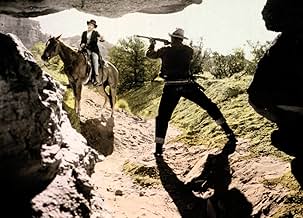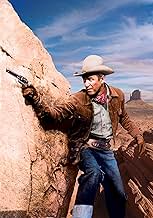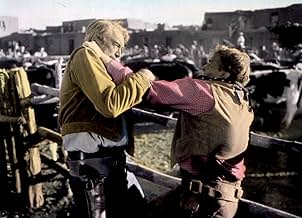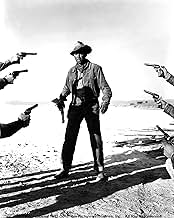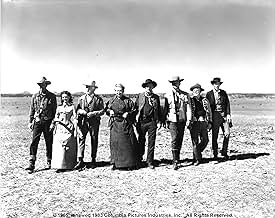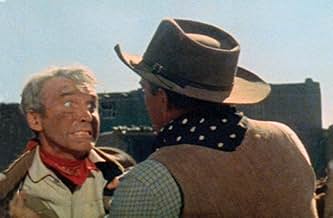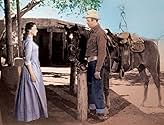NOTE IMDb
7,3/10
13 k
MA NOTE
Nouveau venu, Will Lockhart défie le baron local du bétail et son fils sadique en travaillant pour l'un de ses plus anciens rivaux.Nouveau venu, Will Lockhart défie le baron local du bétail et son fils sadique en travaillant pour l'un de ses plus anciens rivaux.Nouveau venu, Will Lockhart défie le baron local du bétail et son fils sadique en travaillant pour l'un de ses plus anciens rivaux.
- Réalisation
- Scénario
- Casting principal
Beulah Archuletta
- Woman at Indian Wedding
- (non crédité)
Jack Carry
- Mule Driver
- (non crédité)
Bill Catching
- Mule Driver
- (non crédité)
Frank Cordell
- Mule Driver
- (non crédité)
Avis à la une
The Man from Laramie (1955)
You have a right to expect a movie starring James Stewart, directed by Anthony Mann, and photographed by Charles Lang to be spectacular. And it is. This is one of the first full wide screen Technicolor movies, and it's one drawback might be that it is trying to apply a new format to an old and slightly tired genre. The fact it rises above its familiarity is to Stewart's credit and Mann's. Lang (who photographed an extraordinary number of great black and white films) trades stately perfect color and design for pure drama and intensity, which are very different things, but it gives a full backdrop to the high drama here.
This is a beautiful movie, for sure, in its restrained way. (The fact that it's restrained when the whole world is gaping for surging new big color movies is a small miracle in itself.) Mann did a number of westerns, for which he's most known, and a few other genre pics, but first made his name as a film minor film noir director. He seems to carry over enough of the edginess and cruelty of those noirs to make his Westerns exciting rather than epic, which is a good thing. He and Stewart worked together on five westerns, and they have taken on a life of their own, and a feeling of their own that's impressive once you click into it. One of the best noir elements to the story (which was not written by Mann) is the feeling of the lone man against the world, a great theme.
The key woman lead is a cliché, the widow hanging on against the odds in town. In this case she is a charming but slightly miscast Cathy O'Donnell, a favorite of mine who takes demur and innocent to the heights. You see from the outset that this widow and Stewart's good, hard working character are destined for some kind of meeting of destinies. And there are inevitable clichés, too, that you might get used to--the stoic Indians, the older woman as tough as nails (and a gem of a role), a patriarch with a thoughtful wise look that shows counteracting wisdom, and fistfights in the dust. It's all great stuff, in the Western mold. (One fight is right in the middle of a mooing herd of cattle, and it's pretty fun.)
You do wonder sometime at the possibility of a super nice guy sticking it out against all these obstacles, and I mean obstacles. The domineering (and sometimes evil) family led by Donald Crisp, with the always impressive Arthur Kennedy as the chief hand, seems like more than a man could handle. But the conflict is real, and the movie makes it pertinent beyond being "just" a western. And beautifully done. Even if you don't like westerns, this will grab you anyway.
You have a right to expect a movie starring James Stewart, directed by Anthony Mann, and photographed by Charles Lang to be spectacular. And it is. This is one of the first full wide screen Technicolor movies, and it's one drawback might be that it is trying to apply a new format to an old and slightly tired genre. The fact it rises above its familiarity is to Stewart's credit and Mann's. Lang (who photographed an extraordinary number of great black and white films) trades stately perfect color and design for pure drama and intensity, which are very different things, but it gives a full backdrop to the high drama here.
This is a beautiful movie, for sure, in its restrained way. (The fact that it's restrained when the whole world is gaping for surging new big color movies is a small miracle in itself.) Mann did a number of westerns, for which he's most known, and a few other genre pics, but first made his name as a film minor film noir director. He seems to carry over enough of the edginess and cruelty of those noirs to make his Westerns exciting rather than epic, which is a good thing. He and Stewart worked together on five westerns, and they have taken on a life of their own, and a feeling of their own that's impressive once you click into it. One of the best noir elements to the story (which was not written by Mann) is the feeling of the lone man against the world, a great theme.
The key woman lead is a cliché, the widow hanging on against the odds in town. In this case she is a charming but slightly miscast Cathy O'Donnell, a favorite of mine who takes demur and innocent to the heights. You see from the outset that this widow and Stewart's good, hard working character are destined for some kind of meeting of destinies. And there are inevitable clichés, too, that you might get used to--the stoic Indians, the older woman as tough as nails (and a gem of a role), a patriarch with a thoughtful wise look that shows counteracting wisdom, and fistfights in the dust. It's all great stuff, in the Western mold. (One fight is right in the middle of a mooing herd of cattle, and it's pretty fun.)
You do wonder sometime at the possibility of a super nice guy sticking it out against all these obstacles, and I mean obstacles. The domineering (and sometimes evil) family led by Donald Crisp, with the always impressive Arthur Kennedy as the chief hand, seems like more than a man could handle. But the conflict is real, and the movie makes it pertinent beyond being "just" a western. And beautifully done. Even if you don't like westerns, this will grab you anyway.
Another solid western by a man who gave some of the best works of the whole genre (the naked spur, cimarron,etc).This is the story of a double search:Stewart is looking for the man who's responsible for his brother 's death.Crisp is afraid of a man who might possibly kill his son:he has a recurrent dream which frightens him .Little by little the two stories converge and make one in one of the most brilliant western screenplays of the fifties.The dreamlike touch gives a movie another dimension,which only great directors can conjure :Walsh,Ford ,Daves,or of course Mann.
The characters are more complex than we thought at first sight,and the cliché of the old wealthy man with a son -black-sheep-of-the-family and an almost- adoptive- son-good-boy is avoided.Alex Nicol and Arthur Kennedy give strong nervous tortured portrayals which almost outshine star Stewart.Crisp is equally effective in the part of a man who tries not to face the truth -which may be the meaning of his premonitory dream-,and will finally see it when he is blind.The lead female part is the weakest link of the movie ,but Aline MacMahon's colorful Kate more than makes up for Cathy O'Donnell's blandness.
I had seen this movie for the first time when I was 13.I saw it again yesterday.It has not aged a bit.
The characters are more complex than we thought at first sight,and the cliché of the old wealthy man with a son -black-sheep-of-the-family and an almost- adoptive- son-good-boy is avoided.Alex Nicol and Arthur Kennedy give strong nervous tortured portrayals which almost outshine star Stewart.Crisp is equally effective in the part of a man who tries not to face the truth -which may be the meaning of his premonitory dream-,and will finally see it when he is blind.The lead female part is the weakest link of the movie ,but Aline MacMahon's colorful Kate more than makes up for Cathy O'Donnell's blandness.
I had seen this movie for the first time when I was 13.I saw it again yesterday.It has not aged a bit.
Director Anthony Mann and actor James Stewart combined to make several westerns and they were all very good. Make that "excellent." This is one of them and it gets high marks for an involving story.
It also features what I call "realistic dialog," along with interesting characters and a film noir feel to it. That's no surprise since Mann directed a few film noirs. Along that noir theme, be warned this is not an upbeat story, a feel-good Jimmy Stewart film that most people remember him by. In here, he's a vengeful guy here (but, yeah, still a good man at heart). Donald Crisp also demonstrates an overt double-edged sword, so to speak, being a very gruff but fair land owner.
Some of the best lines in the movie are delivered by Ailine MacMahon, an older woman friend who helps Stewart. Cathy O'Donnell plays the female romantic lead but is a bit on the bland side, frankly.
Good story.....solid western.....deserves to be better known. Buy the DVD. It''s cheap. You won't be sorry.
It also features what I call "realistic dialog," along with interesting characters and a film noir feel to it. That's no surprise since Mann directed a few film noirs. Along that noir theme, be warned this is not an upbeat story, a feel-good Jimmy Stewart film that most people remember him by. In here, he's a vengeful guy here (but, yeah, still a good man at heart). Donald Crisp also demonstrates an overt double-edged sword, so to speak, being a very gruff but fair land owner.
Some of the best lines in the movie are delivered by Ailine MacMahon, an older woman friend who helps Stewart. Cathy O'Donnell plays the female romantic lead but is a bit on the bland side, frankly.
Good story.....solid western.....deserves to be better known. Buy the DVD. It''s cheap. You won't be sorry.
Will Lockhart (James Stewart) leaves his home in Laramie on a mission to find out who was responsible for selling repeating rifles to the Apaches who killed his brother. Landing in Coronado, New Mexico, he finds that most of the territory is owned and ruled by Alec Waggoman (Donald Crisp), a fierce patriarchal rancher with one loose cannon son, Dave (Alex Nicol) and another surrogate son, Vic Hansboro (Arthur Kennedy) running the Barb Ranch. As he digs deeper, Lockhart finds he is in the middle of two wars, one of which may eventually conclude his revenge fuelled mission.
The Man From Laramie is the last of the five Westerns that director Anthony Mann made with leading man James Stewart. The only one filmed in CinemaScope, it is a visually stylish picture that is full of brooding psychological themes and boasts great acting and a tight script. It's no secret that Mann, before his sad death, was looking to make a Western King Lear, The Man From Laramie serves as a delicious starter to what would have been the main course. With its family dilemmas and oedipal overtones, Mann's Western is very Shakespearian in tone. That its characters are sumptuously framed amongst a harsh dangerous landscape further fuels the psychological fire; with the landscapes (terrificly photographed by Charles Lang) providing a link to the characters emotional states. So many scenes linger long and hard in the memory (none of which I would dare to spoil for would be new viewers), so much so they each reward more upon subsequent revisits to the film. There's some minor quibbles down the pecking order; for instance Cathy O'Donnell as Barbara Waggoman is poor and contributes little to proceedings, but really it remains a quality piece of psychological work that barely gives us reason to scratch the itch.
Taut, tight and tragic is The Man From Laramie, brought to us courtesy from the dynamite partnership of Mann & Stewart. 9/10
The Man From Laramie is the last of the five Westerns that director Anthony Mann made with leading man James Stewart. The only one filmed in CinemaScope, it is a visually stylish picture that is full of brooding psychological themes and boasts great acting and a tight script. It's no secret that Mann, before his sad death, was looking to make a Western King Lear, The Man From Laramie serves as a delicious starter to what would have been the main course. With its family dilemmas and oedipal overtones, Mann's Western is very Shakespearian in tone. That its characters are sumptuously framed amongst a harsh dangerous landscape further fuels the psychological fire; with the landscapes (terrificly photographed by Charles Lang) providing a link to the characters emotional states. So many scenes linger long and hard in the memory (none of which I would dare to spoil for would be new viewers), so much so they each reward more upon subsequent revisits to the film. There's some minor quibbles down the pecking order; for instance Cathy O'Donnell as Barbara Waggoman is poor and contributes little to proceedings, but really it remains a quality piece of psychological work that barely gives us reason to scratch the itch.
Taut, tight and tragic is The Man From Laramie, brought to us courtesy from the dynamite partnership of Mann & Stewart. 9/10
...with this Technicolor tale examining vengeance, moral culpability, and familial loyalty. Stewart plays Will Lockhart, whose brother was killed in a cavalry ambush. The ambush was carried out by the Apaches. The question Lockhart wants answered is who provided the Apaches with the rifles used in the attack. His journey takes him to a sprawling ranch in New Mexico, lorded over by Alec Waggoman (Donald Crisp), a man who may have lived by the ethos of rugged individualism, but now, in his twilight, develops a belated sense of right and wrong.
The film also stars Arthur Kennedy as the faithful ranch employee who simmers with resentment over not being appreciated; Alex Nicol as Waggoman's hotheaded son, a character with a violent streak; and Cathy O'Donnell as Alec's niece and Lockhart's love interest.
The film also stars Arthur Kennedy as the faithful ranch employee who simmers with resentment over not being appreciated; Alex Nicol as Waggoman's hotheaded son, a character with a violent streak; and Cathy O'Donnell as Alec's niece and Lockhart's love interest.
Le saviez-vous
- AnecdotesJames Stewart stated that of all the westerns he made this one was his personal favorite.
- GaffesTwo of Dave's men are holding Lockhart as Dave prepares to shoot Lockhart's hand. One of the two men is in the direct line of fire, and since Dave is shooting Lockhart's hand at point blank range, the bullet would have gone through his hand and struck Dave's henchman.
- Citations
Will Lockhart: What are you stickin' your neck out for, Charley?
Charley O'Leary: I'm a lonely man, Mr. Lockhart. So are you. I don't suppose we spoke ten words comin' down here, but I feel that I know ya, and I like what I know.
- ConnexionsFeatured in Rien ne sert de courir (1966)
Meilleurs choix
Connectez-vous pour évaluer et suivre la liste de favoris afin de recevoir des recommandations personnalisées
- How long is The Man from Laramie?Alimenté par Alexa
Détails
Box-office
- Montant brut mondial
- 6 317 $US
- Durée
- 1h 43min(103 min)
Contribuer à cette page
Suggérer une modification ou ajouter du contenu manquant



